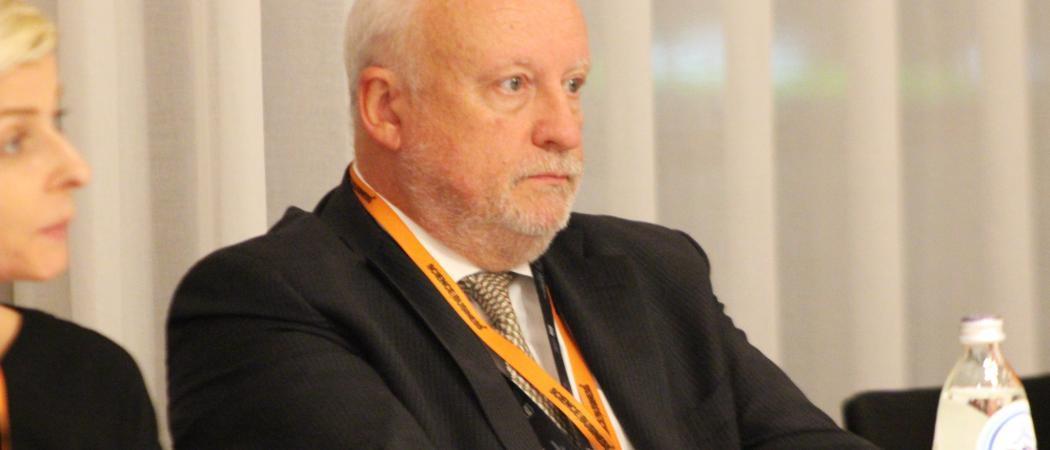New public private partnership involving companies across all aspects of healthcare will launch its call first in mid-June

Pierre Meulien, executive director of the Innovative Medicines Initiative. Photo: Lysiane Pons, Science|Business
The Innovative Health Initiative (IHI) is set to put €2.4 billion into collaborative health research projects between industry, academics and SMEs starting this June, following the formal launch on Wednesday.
The IHI is the successor to Innovative Medicines Initiatives (IMI) 1 and 2, which since 2008 has been working to speed up the translation of academic research into new drugs.
With the launch of IHI, the brief is now expanded beyond pharmaceuticals to include biotechnology, medical technology, diagnostics and digital health.
IHI also has a broader remit, to cover the continuum of healthcare and of health technologies, to create synergies around the way in which these technologies are converging, and to bring digital technology and data analytics into play.
Projects will focus on translation of research from Europe’s academic base into health products and services that are designed from the start to meet to public health needs and to be suitable for use in Europe’s healthcare systems.
“IHI builds of course, on the 14 years of experience with IMI and strives to be more inclusive, integrating sectors well beyond the pharmaceutical industry,” said Pierre Meulien, executive director of IMI, speaking at the launch.
“This is necessary to both accelerate innovation for the benefit of European citizens and help maintain the industrial competitivity of the European healthcare industry sector,” said Meulien, who is to head the IHI for the first few months while the European Commission looks for a successor.
IHI is one of ten large scale public private partnership, or joint undertakings, being funded as part of the Horizon Europe research programme. Member states agreed on their formation in November after months in the pipeline, allowing the initiatives to get off the ground this year.
Horizon Europe will put in €1.2 billion in grants to support public sector researchers and SMEs involved in projects, with the industry putting in €1 billion in the form of in kind contributions such as staff time and access to laboratory facilities. The remaining €200 million will come from other partners, such as research foundations.
One of the big criticisms of the predecessor IMI programmes was that the pharma industry had monopoly control, with the research directors of the leading pharma companies setting out the research agenda.
Apart from expanding the scope of IHI to include the full spectrum of healthcare companies, the governance has been upgraded. At the launch, IHI already has an agreed strategic research and innovation agenda, hammered out between the European Commission and a broad group of stakeholders.
The research agenda will be implemented under the guidance of the governing board, which along with representatives from each of the industry bodies will include members from four different European Commission directorates.
The governing body will be work with a new science and innovation panel that will include representatives from across the healthcare value chain, and with a remit is to ensure IHI projects reflect the needs of healthcare providers and of patients.
The topics for research in the first year of IHI are expected to be published in April, with the first calls around mid-June, and deadlines at the end of September. This would mean the results will be out by the end of November for single-stage calls and the grants will be signed before March 2023. For two-stage calls, the evaluation and grant agreements will take longer, with the process ending in July 2023.
This time around, the majority of calls will be single stage, offering more flexibility. “It should be a bit more open, a bit more bottom-up,” said Hugh Laverty, head of scientific operations at IHI.
More open than before
In some senses IHI will be a continuation of IMI, with ongoing IMI projects being handed over to the new initiative, but it will put the emphasis on including more industries, SMEs, patients and eastern European states.
The governing board will be made up of five industry associations: the European Federation of Pharmaceutical Industries and Associations (EFPIA), vaccines Europe, EuropaBio, MedTech Europe, and COCIR (which represents medical imaging and radiotherapy companies).
Commission staff from four directorates of research and innovation; health; digital; and internal market, industry, entrepreneurship and SMEs, will also hold seats.
The Science and Innovation Panel will be made up of scientists, patients’ groups, regulatory experts, health economists, and others.
The more diverse governing structure will make IHI more inclusive and accessible to citizens, SMEs, and organisations from eastern European, Meulien said. “I’ve always maintained that there is no reason why their involvement should be lower than other parts of Europe.” The aim will be to make IHI attractive to all Europeans.”





 A unique international forum for public research organisations and companies to connect their external engagement with strategic interests around their R&D system.
A unique international forum for public research organisations and companies to connect their external engagement with strategic interests around their R&D system.